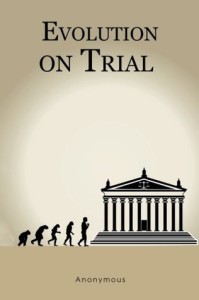Although many academics and scholars would argue that the debate over evolutionary theory is over, there are also those who believe that this Revolutionary “theory” should still be questioned. In the aptly named Evolution on Trial, the book’s anonymous author presents the case for both sides, and does so with strongly stated “non-bias.” However, it becomes apparent within the first few chapters that the author doesn’t believe that evolution is true, and the writing has undercurrents of this doubt from the very first page.
When it comes to books discussing the validity or falsity of evolution, a clear-cut dichotomy is usually made: the author is either pro-evolution (anti-religious) or pro-Creationism (anti-science). What makes this book interesting is that the author presents the facts as they are currently known. Granted, omissions are made, but there aren’t blatant lies populating the text. That being said, the research backing of many authorial claims seems weak, or even non-existent, and the lack of a bibliography lends itself to doubt.
Some other textual claims are somewhat vague and suggestive, but are not always defended or explained further. For example, “The first part of this argument [evolution] presumes that as all life shares similar characteristics, then all life must be related. Now, this is a big presumption for evolutionary theory to make, and one which is not founded on scientific principles.” Quotes like these are peppered throughout the writing, and they can be misleading. The tone is scientific and the language seems technical and academic, but there is a good deal of opinion masquerading as proof. While this may help strengthen certain arguments in the book, for those readers who firmly believe in evolution as fact, the author’s position could be enough for them to put the book down.
However, the professional tone of the writing argues in favor of the writer’s credibility, although at certain points, the analogies and explanations get a bit tangential and overly complex. The author has a clear conclusion he wants readers to reach, which can be frustrating for those who want to learn, not be convinced. For example, one chapter ends with a rather concrete statement: “In conclusion, evolutionary theory is illogical.”
Technically speaking, the arguments are laid out in an intuitive pattern, and there is a great deal of insightful, factual science included, the validity of which is not up for debate. The author obviously did a significant amount of research, and provides a good foundation for readers who are new to the idea of evolution, or at least new to the debate surrounding it.
Despite the self-proclaimed impartiality of the author, the preface alone gives a hint as to the author’s true purpose, claiming that, “evolutionary theory has not met the burden of proof.” However, if you are willing to give that bold declaration a pass, sharpen your debating skills, and step into a discipline that is still characterized by uncertainty, the book is a truly fascinating read. Its reasoning is flimsy at times, persuasive at others, but the information is conveyed with a sense of sobriety that is appreciated in this type of text.
Review Overview
Design
Editing
Content
Get an Editorial Review | Get Amazon Sales & Reviews | Get Edited | Get Beta Readers | Enter the SPR Book Awards | Other Marketing Services
























Leave A Comment